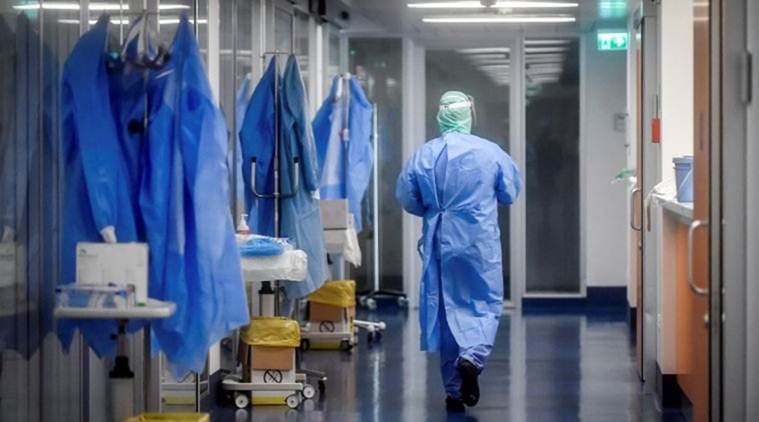 Karnataka requires hospital or institutional quarantine, depending on symptoms, for all Covid-19 patients. On Wednesday, with cases surging, experts advised the government to adopt a home quarantine policy for asymptomatic cases.
Karnataka requires hospital or institutional quarantine, depending on symptoms, for all Covid-19 patients. On Wednesday, with cases surging, experts advised the government to adopt a home quarantine policy for asymptomatic cases.
A system designed to centralise bed allocations in Bengaluru, with the municipal corporation given the powers to inform patients, determine the severity of their symptoms, and ensure their transfer in ambulances to hospitals or care centres, has led to chaos in the city.
Ambulances, often carrying multiple people, are waiting for hours outside hospitals as the latter demand paperwork regarding tests, which is not being made available to patients.
On June 27, Karnataka Director of Health and Family Welfare Services Dr Om Prakash Patil issued a circular forbidding government and private laboratories from conveying positive results of Covid tests to individuals concerned directly. They were told to upload the results on the ICMR portal and only share details with state officials.
Revenue Minister R Ashoka, who was given charge of the state’s anti-coronavirus measures on June 25, said once the result was known, officials of the BBMP (Bruhat Bengaluru Mahanagara Palike) “who have access to a spreadsheet with the latest hospital bed positions will find a vacancy and coordinate with the patient and ambulance services to take the patient to the right hospital”.
While this was meant to prevent a situation where patients went from hospital to hospital for a bed, on paper it has led to problems of its own as Bengaluru sees 500-plus cases daily.
On Tuesday, a 25-year-old pregnant woman was left at Victoria Hospital — the largest Covid facility in the city – by an ambulance. As the hospital sought a copy of her test results, her husband tried desperately to reach the BBMP official who had called them.
“My wife had been going for regular examinations to a maternity hospital near our home. On Monday, they asked her to get a Covid-19 test done. Today a city official told us she has tested positive and must be admitted in hospital… They are not allowing us in as we do not have a copy of the report,” the 26-year-old said, standing with her outside the hospital. “She is in good health, I do not know why they want to admit her.”
Karnataka requires hospital or institutional quarantine, depending on symptoms, for all Covid-19 patients. On Wednesday, with cases surging, experts advised the government to adopt a home quarantine policy for asymptomatic cases.
Bengaluru has been seeing more than 500 cases daily since June 27, with the highest single-day spike of 783 on June 28. Its active case numbers stand at 4,649 as on July 1, with 191 patients in ICU. Of its total 5,290 cases, 4,932 have been reported in June alone.
As on June 27, out of 2,033 beds available across government facilities in Bengaluru, 1,770 were occupied. All 100 ICU beds in government hospitals were full. While around 1,500 beds are available in private hospitals on paper for coronavirus patients, they have not been officially allotted to the State.
Tushar Girinath, the official in-charge of streamlining bed allocations for Covid 19 patients in Bengaluru, said they have details regarding vacancies in all hospitals. “Hospital bed positions are updated at regular intervals and patients are allotted to hospitals on this basis,” Girinath said.
However, ambulance drivers say it is they who are facing the brunt of the new system. “We have become like call centres,” M Rudresh, an ambulance driver who had just deposited a 35-year-old, severely unwell patient at Bowring Hospital, said. “BBMP officials tell us to pick up a patient and drop them. We have to coordinate between the patients and hospitals. Sometimes the patients do not have the documents and we are shunted between hospitals. It is chaotic.”
Rudresh said recently, one ambulance was used to pick up five patients. “One doctor refused to get in.” Another ambulance driver said he spent an hour on Monday at Victoria Hospital as relatives of a 56-year-old patient tried to arrange for a copy of her test report. “The hospital said the documentation was not right.”
A hospital official said the relatives had a handwritten note of the test result. “We need a PDF.”
A medical official at a government hospital being used to treat “medium risk” patients, however, pointed out that the streamlining of admissions being tried by the new system was essential. On June 27, for example, the official said, “We had 20 patients waiting outside when all our 150 beds were full.”
Under Karnataka’s three-level system of categorisation of coronavirus patients, those symptomatic and in vulnerable groups, like the elderly above 60, pregnant women and those with co-morbidities, are to be admitted in Covid 19 hospitals; the elderly and those below 60 with no symptoms but co-morbidities are to be taken to dedicated state health centres or private hospitals; and low-risk cases to Covid Care Centres.
Till the third week of June, Bengaluru looked like one of the coronavirus success stories among mega cities – with 827 cases and 43 deaths at a time that Mumbai had 60,228 cases and 3,167 deaths, Delhi 44,688 cases and 1,837 deaths; and Chennai 34,245 cases and 422 deaths. Its practice of quarantining positive cases and identifying contacts within 24 hours of a positive result was lauded as a factor.
Underlining the seriousness of the bed crisis now, a senior doctor at a Covid hospital in Bengaluru said, “We do not know when we will reach the limit, but it already looks like we are getting there.”